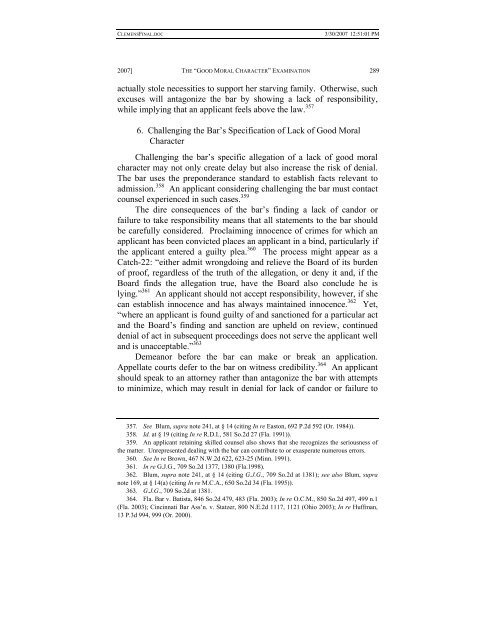Facing the Klieg Lights: Understanding the "Good Moral Character"
Facing the Klieg Lights: Understanding the "Good Moral Character"
Facing the Klieg Lights: Understanding the "Good Moral Character"
You also want an ePaper? Increase the reach of your titles
YUMPU automatically turns print PDFs into web optimized ePapers that Google loves.
CLEMENSFINAL.DOC<br />
3/30/2007 12:51:01 PM<br />
2007] THE “GOOD MORAL CHARACTER” EXAMINATION 289<br />
actually stole necessities to support her starving family. O<strong>the</strong>rwise, such<br />
excuses will antagonize <strong>the</strong> bar by showing a lack of responsibility,<br />
while implying that an applicant feels above <strong>the</strong> law. 357<br />
6. Challenging <strong>the</strong> Bar’s Specification of Lack of <strong>Good</strong> <strong>Moral</strong><br />
Character<br />
Challenging <strong>the</strong> bar’s specific allegation of a lack of good moral<br />
character may not only create delay but also increase <strong>the</strong> risk of denial.<br />
The bar uses <strong>the</strong> preponderance standard to establish facts relevant to<br />
admission. 358 An applicant considering challenging <strong>the</strong> bar must contact<br />
counsel experienced in such cases. 359<br />
The dire consequences of <strong>the</strong> bar’s finding a lack of candor or<br />
failure to take responsibility means that all statements to <strong>the</strong> bar should<br />
be carefully considered. Proclaiming innocence of crimes for which an<br />
applicant has been convicted places an applicant in a bind, particularly if<br />
<strong>the</strong> applicant entered a guilty plea. 360 The process might appear as a<br />
Catch-22: “ei<strong>the</strong>r admit wrongdoing and relieve <strong>the</strong> Board of its burden<br />
of proof, regardless of <strong>the</strong> truth of <strong>the</strong> allegation, or deny it and, if <strong>the</strong><br />
Board finds <strong>the</strong> allegation true, have <strong>the</strong> Board also conclude he is<br />
lying.” 361 An applicant should not accept responsibility, however, if she<br />
can establish innocence and has always maintained innocence. 362 Yet,<br />
“where an applicant is found guilty of and sanctioned for a particular act<br />
and <strong>the</strong> Board’s finding and sanction are upheld on review, continued<br />
denial of act in subsequent proceedings does not serve <strong>the</strong> applicant well<br />
and is unacceptable.” 363<br />
Demeanor before <strong>the</strong> bar can make or break an application.<br />
Appellate courts defer to <strong>the</strong> bar on witness credibility. 364 An applicant<br />
should speak to an attorney ra<strong>the</strong>r than antagonize <strong>the</strong> bar with attempts<br />
to minimize, which may result in denial for lack of candor or failure to<br />
357. See Blum, supra note 241, at § 14 (citing In re Easton, 692 P.2d 592 (Or. 1984)).<br />
358. Id. at § 19 (citing In re R.D.I., 581 So.2d 27 (Fla. 1991)).<br />
359. An applicant retaining skilled counsel also shows that she recognizes <strong>the</strong> seriousness of<br />
<strong>the</strong> matter. Unrepresented dealing with <strong>the</strong> bar can contribute to or exasperate numerous errors.<br />
360. See In re Brown, 467 N.W.2d 622, 623-25 (Minn. 1991).<br />
361. In re G.J.G., 709 So.2d 1377, 1380 (Fla.1998).<br />
362. Blum, supra note 241, at § 14 (citing G.J.G., 709 So.2d at 1381); see also Blum, supra<br />
note 169, at § 14(a) (citing In re M.C.A., 650 So.2d 34 (Fla. 1995)).<br />
363. G.J.G., 709 So.2d at 1381.<br />
364. Fla. Bar v. Batista, 846 So.2d 479, 483 (Fla. 2003); In re O.C.M., 850 So.2d 497, 499 n.1<br />
(Fla. 2003); Cincinnati Bar Ass’n. v. Statzer, 800 N.E.2d 1117, 1121 (Ohio 2003); In re Huffman,<br />
13 P.3d 994, 999 (Or. 2000).
















